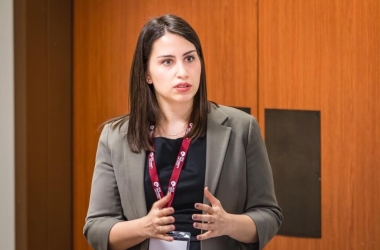Guest Lecture Takes Closer Look at EU Law and the Chocolate Directive

Ezgi Arık's EU Law Lecture at Wittenborg Engages BBA Students in Chocolate Directive Role-Play
This January, students on Wittenborg's Bachelor of Business Administration (BBA) programme in Apeldoorn had the unique opportunity to delve into EU (European Union) law-making processes with a guest lecture by Ezgi Arık.
Arık is a PhD candidate at Leiden University's Institute for Tax Law and Economics. She holds a Bachelor of Arts degree in Law from Koc University, Istanbul. Before joining Leiden University, she worked as a research and teaching assistant in the Tax Law Department of Koc University Law School. She is also a certified lawyer in Turkey.
The theme of the lecture, 'Business Contract Negotiations in the International Arena,' took students on a journey through the complexities of EU law, with a special focus on the 'free movement of goods'. The session commenced with an introduction to key EU institutions such as the European Council, the European Commission, the European Parliament, and the Council of the European Union, and the vital role they play in shaping legislation.
"The rest of the lecture was devoted to a 'role-play game' on the EU Chocolate Directive," Arık explained. This directive harmonises the labelling of cocoa and chocolate products, establishing definitions for these products to enable consumers to make informed choices.
"The main message was clear: addressing the difficulties in the EU's law-making processes, as each member state might have different interests, and it is not always easy to reach a common decision. Additionally, the European Parliament and the Council of the European Union must reach a common decision as co-legislators, which is not always easy either."
During the role play, a student posed an insightful question: "What would happen if the Council of the EU was in favour of the proposal but not the European Parliament?" Arık responded: "If the European Parliament disagrees with the proposal, then the proposal will not be accepted."
Arık later said, "It was a spot-on question," which emphasises the difficulties in the EU's law-making process. She also said that the lecture was fun for her and the students. "The students represented the states and relevant EU institutions very well. They were well engaged in the game, and we conducted a very interactive class."
Bojan Georgievski, Associate Professor of Applied Sciences at Wittenborg, emphasised the innovative nature of Arık's guest lecture. "While the primary focus was on decision-making processes, Arık seamlessly incorporated additional information on the principles of the European Union."
WUP 17/02/2024
by Erene Roux